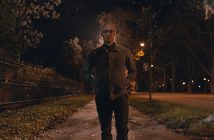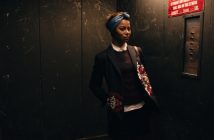
Goat (dir. Andrew Neel, 2016)
Directed by Andrew Neel, the hazing drama Goat, based on the acclaimed memoir of Brad Land, was adapted by Andrew Neel, David Gorden Green and Mike Roberts for the big screen. After screening at Sundance, the film had its European premiere at the Berlinale within the Panorama section. It offers a tense story about two brothers and questions the behaviour within male communities — in this case a university fraternity. When the sensitive younger brother Brad (Ben Schnetzer) starts his freshmen year, he is eager to pledge for the fraternity his older, tough brother Brett (Nick Jonas), who is already a member of the club. A few months before attending university, Brad was beaten up by two strangers after a party he went to with his brother. Ever since this incident he keeps questioning his own masculinity because he didn’t fight back. He continues to live in fear and develops post-traumatic stress disorder. Once he begins a new chapter in his life at his new university, he pledges for the fraternity in order to belong to a community that protects him and offers him life-long friendships. However he is facing similar physical and psychological challenges during “hell week” that remind him of his attack as soon as he is getting – voluntarily – humiliated and abused by his future so-called brothers. The film depicts the brutal side of young men, their abuse of power and their need for a “masculine identity” in a community within the Greek system. Goat questions this abusive behaviour and provokes a discussion about a long tradition at American universities, hopefully among those who are involved in these “traditions” to proof that one is qualified for such a “prestigious” group of men.
During the festival I got to talk to Andrew Neel about working on the film and the important questions he is raising by focusing on an issue that a lot of people keep quite about.
We have seen hazing only partially in movies before. What was your initial idea to explore this whole fraternity society and the notion of hazing?
It’s interesting that there hasn’t been a movie on hazing quite honestly. In large part men feel uncomfortable in the whole notion of hazing and what it really means to be a man. When Killer Films first brought the script to me, I thought to myself that there has to be a good movie about it and I was surprised that there wasn’t. I feel lucky to be the first person to tackle this. I was talking to someone else today who asked me the same question and it was the first time I really thought about it. Probably, part of the reason why it hasn’t been dealt with is exactly for the same reason that the issue of what we are dealing with in the movie is that men are probably uncomfortable in dealing with the issue of hazing. It starts to examine the fundamental notion of who we are supposed to be and because the world is male-dominated, it is sort of the foundation of everything that we are and the way that the world works. That might be a reason why the movie hasn’t been made yet. As far as I am concerned, Lord of the Flies is one of my favorite books. I am really interested in a newer tribalism. I think that we are animals and although we like to think that we are not animals, we actually are. All social organization is an attempt to control some of our darkest tendencies. What makes humans so successful and beautiful in a lot of ways is the tribe because we do care about each other and we want to have these deep connections and rely on each other. In the modern world there are not that many opportunities to define ourselves within a group. Those communities have to be fabricated. We live in intentional communities, so fraternities are just one attempt, maybe a misguided attempt, to create real tribal bonds.
Watching the film is an odd experience for the audience since you don’t let them get away from what’s happening, your gaze is constantly on it.
The movie makes you directly confront what Brad is processing. One of my intentions was to make people feel like they are going through the process themselves. I feel like people reference hazing all the time and it is sort of accepted in our culture. I even think that there is some form of hazing in organized athletics or gangs and all those things. There is a lot of this kind of behaviour going on, in any group of men or women but it is usually worse with men. It was important to push it in the audience’s face because I felt that people really needed to stop thinking about it in an Animal House way and start thinking about it realistically in terms of what it is actually like. I think that we laugh it off because it is very uncomfortable and it is also scary to look at that part of ourselves. I love Animal House by the way, it is a great and funny movie but Animal House had a different intention.
Pushing the envelope is a very brave decision because part of the film’s experience is quite nosy. You don’t often get to see things like that in American movies.
I tend to be a very aggressive personality intellectual speaking; I really like confrontation in films. I think that we are so over-mediated and we have seen way too many movies and very often I just feel dead with so many films. You know, that shot were somebody goes underwater in the bathtub – how can you keep using this shot? Really good filmmakers use that shot and I am wondering “Do people really do that? And if they do, are they not having a meta-experience were they are doing what they think they are supposed to do because it is done in movies?” We have got to stop using this shot. There are all these conventions in movies; the language for example is so overused. A lot of times it doesn’t mean anything anymore. I think to get people to pay attention you have to do little things. It doesn’t have to be yelling or screaming, it can be staying on a shot for much longer than people expect — to shock people of their humdrum experience with watching movies. I mean I watch dumb movies all the time, in fact sometimes I am so exhausted that I can’t watch a serious movie. There are different ways to enjoy a movie but if you want an intellectual and rigorous experience I think that you have to watch movies that are in one way or another confrontational. I try to make movies like that.
Producer Christine Vauchon was already attached to the project when you got on board. How much has she influenced your work on the movie?
Christine is probably the most important legacies of gender issue movies, really every [movie]. I think this is another evolution of her dialogue about what it means to be a man and what it means to be a woman in the modern age. She believes in you as a director and she chooses you because she thinks you are right for the material and then she wants you to do what you want. She is very hands off but I think her career is evidence of the fact that she chooses people who make sense for the movie, for the material.
Did you read the script before the book? And did you work with David Gordon Green at all?
David wrote the script in 2004 and he was going to direct it. He put the film together and he was a little known director at that time. He had his big break-out with George Washington and then the writer’s strike happened and the film sort of fell apart. The script then got moved to a bunch of different directors and some of them did their own rewrites. Jeff Nichols was going to do it for a while but it didn’t end up working out. When I had the script I wanted to make it contemporary because the script was written in 2004. The images Brad takes of himself used to be polaroid but I thought the iPhone would be much better. We changed some other stuff that me and my writing partner were interested in. Most of my interactions with David were actually when we were setting the film up. He is totally hands-off. He really knows what it is like to be a director, obviously. He didn’t want to get in my way and he was incredibly generous in terms of supporting the film. He did a couple of things that really made things possible. Interestingly, he became really good friends with Brad Land. I think that actually got complicated for him when we were developing the film, not in terms of writing a good script but in terms of the reality of making the movie. He talked to me a lot about that. And Brad didn’t want to come to the premiere to Sundance. He was going to but he decided that he couldn’t handle it. He was really positive about the film and he came to the set but he has never seen it. I think he suffers from a form of PTSD in a way.
I remember hazing from Dazed and Confused and there were a lot of girls and these girls were involved in most part of the hazing. Yet in your movie there are almost no girls. The few girls are just toys and sexual objects. There is this masculine perspective in the movie, which makes it more brutal and primal in a way, for example the opening scene with the screaming in slow motion.
There are very few women in the book and in the movie. I realized that most of the times girls were just toys. I think in large part they are treated that way by specific cultures, so there was this generalization. I did that very intentionally. I think if you are going to make a version of Lord of the Flies it is very important to not have a woman show up because it would ruin everything in what you are trying to do. Actually, Virginia Gardner is in that one significant scene with a woman. We put her in because we were worried that people wouldn’t be able to stay in this horror film, that it would completely exhaust people to that point where they would have to leave and stop watching. In a fraternity you are dealing with a totally hermetic environment or an incubator in which you can observe male behaviour when it is most uncontrolled.
Why do think is it that a lot of young men accept to be humiliated by their future brothers? On the one hand, fraternities have a really bad reputation but then again they are so prestigious and those in a fraternity will at one point have jobs in very high positions, which is such a strange paradox. They behave in such a brutal and animalistic way but will eventually be the so-called future of our society.
I think that at least in the several thousand years human history is defined by boy clubs. That is what we have done for a very long time. Men have created clubs that are hard to get into and then they control everything and treat women like slaves and shit on everyone else who is not in the club. I think it is a very natural part in most cultures to create for example a council of nobility. It is a very typical part of human and social organization. In the instance of fraternities, Wall Street and all these power positions guys get into – it is possible that what they experience in these fraternities had a negative effect to one extent or another on who they are and how they think of the world. I think it is really important for men to talk about the darker parts of masculine definition because if we don’t, all these darker inclinations in us are just running rampant without any dialogue around them. I think in the developed world women have been given at least a playbook about what might happen to them and what they have to put up with. Men have not been given any playbook at all about what they are supposed to be and how the are supposed to confront what they are given by their society.
There was this great documentary (The Hunting Ground) last year which spoke about rape culture in colleges and the humiliation culture so to speak, yet colleges turn a blind eye to it. Your film doesn’t touch on that.
I felt like I could only handle so much in the movie because for example in the South there is also the racial issue, then, in general, there is bigotry that is condoned by fraternities and there is a rape culture. I felt like I needed to contain the narrative to one theme and if I started dropping all that stuff in there it might get a little bit messy. Also, to be fair to the book, rape wasn’t really part of the book. There was one woman who got raped on campus while they were hazing. Brad didn’t know her so it wasn’t really a substitute part to the story and I think part of the reason it works is because it is very focused on that experience men have with other men.
There is this one scene in which the girl kicks him out of the bed. Can you tell me why you included that?
This had nothing to do with including or not including women in the movie. That was actually to demonstrate that Brad was still emotionally damaged. He was looking for some kind of emotional connection to somebody and I think when you watch that scene you groan and be like “Oh my God”.
It is the one scene that plays as comedy.
Yeah, I think everyone has been in that situation. At least I have been in that situation (laughs). That was something that a lot of people could associate with. I included that scene because I thought it was a good opportunity to show that, while he was engaging in this whole process of hazing and building himself this fresh, new identity and getting himself out of the depression that he was in, he in fact still was damaged and very confused and that was demonstrated by this interaction with this woman.
Can we talk about the ending of the film?
It is one of the most subtle and interesting parts of the movie. I think there is a catharsis to the extent that their moment in the car together is a moment where Brett tells his brother that it is okay for him to be who he is and that this horrible thing that has happened to him isn’t his fault. It is not because he was insufficient as a man. That is really what Brad wants, for his brother to say: “It is okay. I accept you for who you are”. The very ending is something that a lot of people ask questions about. For me the question has not been answered and we are still in the middle of a discussion about it. I don’t think that Brad walked away from that experience in a conclusive way. He is still in a way lost in that field.
What do you hope your audience, especially young men, will take away from the movie?
I really just hope that men start thinking about what they are supposed to be and people start to initiate a dialogue about masculinity. I think that is a starting place. When we start talking about what it means to be a man maybe we can make things better.



